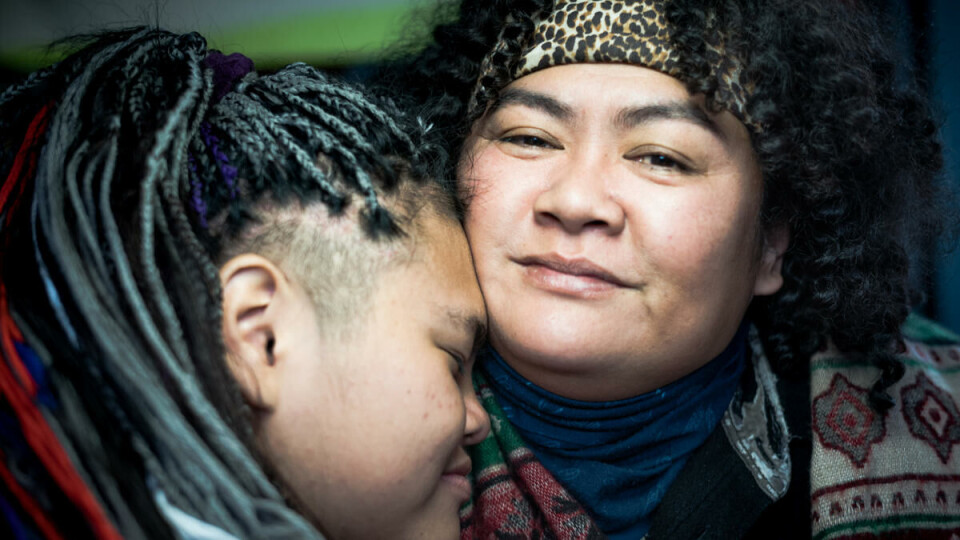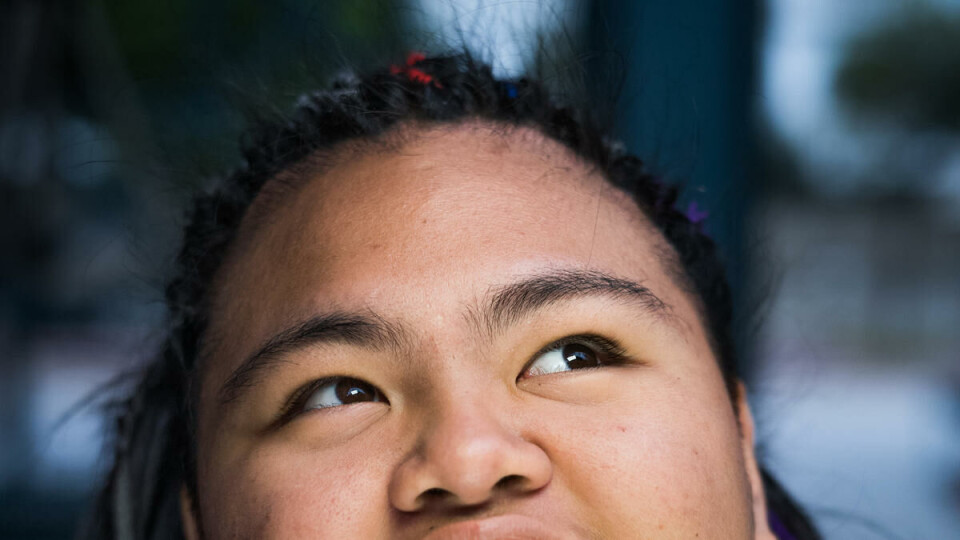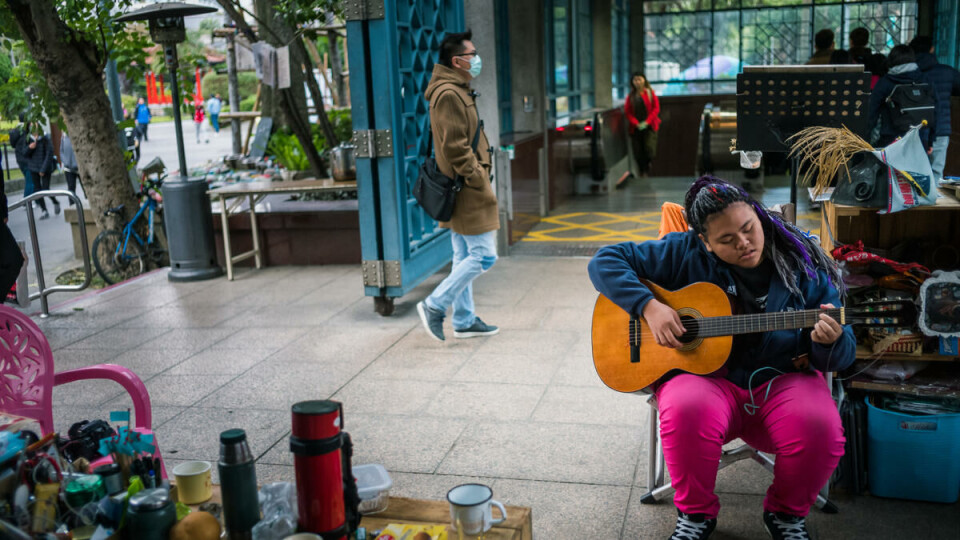
Home alone
When Tosiku Kusui (17) has time off, she travels to Taipei to live with her mother, who has been demonstrating outside a subway station for over a year.
What were you doing when you were 17? Studying hard to get into your dream college? Partying on the weekend? Going on dates?
Tosiku Kusui is from Taiwan and is similar to most teenagers. She’s in her last year of high school, but hasn’t quite decided yet whether she wants to keep studying after. She listens to rap music and watches «Riverdale» on Netflix. She has an Instagram account where she posts photos of herself with mini liquor bottles, and a wallet with a marijuana plant emblazoned on it. These are rebellious years.
But Tosiku doesn’t have parents at home to rebel against, because they’re busy rebelling against the government.
Did you read? Taiwan’s working women lean in, and lean on each other
Makeshift home
In August 2016, president Tsai Ing-wen stood before representatives of Taiwan’s indigenous people, and apologized for how they and their ancestors have been treated for the last 400 years.
«I hope, with my whole heart, that today’s apology will put this country and all its inhabitants on the path to reconciliation,» said Tsai.
When Tsai Ing-wen was inaugurated a few months earlier, Tosiku’s mother, Panai Kusui, had stood at her side, smiling. They were photographed together, and Panai hung the photo in her house. Now she’s made copies of that photo, blown up large, with a single Chinese sign stamped over it: «Liar.»
In february 2017, Tsai Ing-wen approved a new law regarding land belonging to the Taiwanese indigenous people. The law had been under review for a long time, but debate had slowed its path. Of the 18,000 square kilometers originally promised to indigenous people, only 8,000 would be handed over. Private holdings were removed from the law.
My mother language is not supposed to be Chinese, but I can’t even speak the language that I should have grown up with.
Around 2 percent of Taiwan’s inhabitants are indigenous, around 500,000 people. Tosiku’s grandparents belong to the Amis and Puyuma people, two of 16 recognized indigenous groups in Taiwan. The new law made Tosiku’s mom so mad, she moved to Taipei.
Panai travelled from her hometown Taidong, in the south, to the capital city in the north. The day the land law took effect, Panai and hundreds of other demonstrators stormed the gates of the president’s residence in protest. But while the other protestors went home, Panai stayed, and set up camp in what would be her new home.
A year outside
As of March 2018, Panai has lived outside for a whole year. Since Tosiku has to attend school, she can only visit her mother in Taipei when she has some time off. The way it is now, Tosiku sees a future in which she will have to spend her summer vacations, spring festivals, and moon festivals with her mother outside the subway, in an improvised camp.
«When mamma first started demonstrated last year, she explained her reasoning, but I didn’t quite understand. I mean, where are you going to sleep?» It was still very cold outside, Tosiku explained. She speaks English peppered with slang picked up from rap songs, and has a deep, low voice, with a looseness in her sentences. She drags out her vocals, using words like «y’all,» «like,» and «you know.»
«But the first summer I travelled to Taipei to see it for myself, I understood. My mother language is not supposed to be Chinese, but I can’t even speak the language that I should have grown up with – my mom can’t either. I want to do something about it, I want to help. Even though I think this protest is just sort of OK,» Tosiku said.

«Are you off to smoke now?»
After the Chinese New Year and spring festival is over, Tosiku will go back to Taidong, and back to school. She lives alone in her family’s house outside the city. When she misses her mother, she calls her over Skype.
«Sometimes it’s nice to live alone; there’s no one to tell me what to do,» she said. «But I’ve noticed when no one tells me what to do, I’m not always sure what I should do. So the house is a complete mess.»
«But I’m used to it,» she adds. When Tosiku is in Taipei, things are different.
«I wake up around 11 AM or noon, but if it’s my turn to buy breakfast, I wake up around 9. The rest of the day I watch Netflix on my iPhone,» she says, and laughs.
Sometimes Tosiku’s friends visit her, but she doesn’t leave the camp often. When she needs to use the bathroom, she goes to a public toilet in the subway station. If she needs to shower, she goes to the Greenpeace office next door. And Panai has a lot of opinions about what Tosiku should or shouldn’t be doing.
In the future, when Tosiku finds something she thinks is worth fighting for, I will support her. Whether it’s daunting or not.
«Are you off to smoke now?» Panai yells after Tosiku while we’re interviewing here.
Panai arranges events event week. She holds music lessons and lectures, trying to increase awareness of the indigenous peoples’ situation. Sometimes Tosiku helps with a PowerPoint, or just sits on the sidelines with her cell phone.

Like mother, like daughter
Panai is a well-known folk singer, and while we’re visiting the campsite, Tosiku sits down and pulls out her guitar. She hums quietly while plucking at the string, and then breaks out into Radiohead’s «Creep».
She says she feels different from her classmates. «Since I was little, I’ve been with my mom at protests. It’s made my opinions a little different from other people’s. If some people think this or that, and I don’t agree, I get teased. Because I’m different.»
It just seems like they don’t see us, they don’t hear us.
Worth it?
We’ve tried everything to get the president’s attention, but without success,» says Panai. «That’s why we’re here now. We’re not giving up.»
For Panai, the hope is that her daughter will support her, and take a lesson from this demonstration.
«I hope Tosiku sees that no matter what she thinks is important in life, it’s important to follow it. Follow your calling. In the future, when Tosiku finds something she thinks is worth fighting for, I will support her. Whether it’s daunting or not.»
Tosiku says she does not feel pressured to join her mother’s protest. She wants to help, but does not quite know how.
«Earlier in the fall mamma visited a music festival in Taidong. She sold records there and some things with the demonstration slogan «no one is an outsider». The next day I saw some people in my class had bought towels with the slogan on them, and they came to talk to me about the protest. They were totally amazed, just like «wooooow.» «
Tosiku whispers the last word, excited. But lately she’s been feeling stuck. Her classmates don’t seem to care anymore, and her mother still lives outside the Taipei subway station. She says she is starting to lose hope.
«Mamma says she plans on living here for at least three years, until the next president is elected. Until something is done with the case. But the president and the government haven’t given any response. It just seems like they don’t see us, they don’t hear us,» she says.
Is it worth it?
«No,» she answers.































